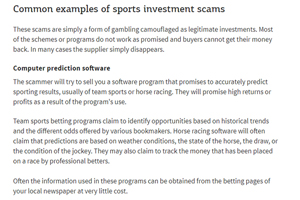Sports Investment Scams
Dive into the realm of sports investment scams, uncovering the dangers of fraudulent sports betting schemes and online investment scams. Learn how to protect yourself from financial risks and stay informed to ensure a secure online experience in the world of sports investments.
 Scammers have cunningly siphoned off millions of dollars, happily depleting the wealth of numerous affluent corporate houses. These unsuspecting companies, falling victim to
these criminal networks, have lodged complaints with cybercrime cells and other revenue authorities. However, people only truly realized the gravity of the situation after
interventions by revenue authorities and cybersecurity forces. If the intelligence agencies and Interpol don't curtail this menace, the growth of investment scams and other
scamming activities is inevitable in the future.
Scammers have cunningly siphoned off millions of dollars, happily depleting the wealth of numerous affluent corporate houses. These unsuspecting companies, falling victim to
these criminal networks, have lodged complaints with cybercrime cells and other revenue authorities. However, people only truly realized the gravity of the situation after
interventions by revenue authorities and cybersecurity forces. If the intelligence agencies and Interpol don't curtail this menace, the growth of investment scams and other
scamming activities is inevitable in the future.
Protecting Against Sports Investment Scams
Sports have unfortunately become a breeding ground for negative activities, with many people falling victim to scammers who operate from various countries, swiftly tricking individuals and looting their hard-earned money.
Scammers often send emails claiming to possess special prediction software that guarantees accurate outcomes in horse races. Horse race enthusiasts, unaware of the deception, may respond to these fraudulent messages and even deposit the requested amounts. Once the money is siphoned off, these scammers vanish without a trace. Common technical terms like wagering, arbitrage, trading, and tipping are used by these scammers to create an illusion of authenticity. While the letters or emails may appear official and professional, careful scrutiny reveals discrepancies. Unfortunately, horse lovers may not thoroughly verify the sender's authenticity, leading to innocent replies and deposits. The criminals make off with the money, leaving the victims without recourse.
Scammers also masquerade as betting syndicates, enticing the public to deposit money and persuading them to invest in sports with promises of high returns. Some unsuspecting individuals may trust these scammers and deposit their money, only to face significant losses. These deceptive individuals may even falsely claim affiliation with securities and investment commissions, convincing commoners to invest. Below are Dos and Don'ts that the public should follow:
Do's:
- Verify the credentials of the sender before responding.
- Double-check with friends or colleagues to see if similar emails are circulating.
- Report the email to the relevant cyber cell for investigation.
- Spread awareness about these scam emails to help protect others.
- Immediately hang up if scammers call you.
Don'ts:
- Avoid responding to any scamming emails.
- Never disclose your PIN, passwords, personal details, or financial information.
- Do not establish close ties or rapport with these scammers.
Taking a Stand Against Scams: A Call for Responsibility
It is crucial for individuals to act responsibly and promptly report any instances of scamming activities to government authorities. The surge in scamming activities has turned various websites into hotbeds for such criminal endeavors. Citizens hold a moral responsibility to impart significant lessons to these wrongdoers. Scammers often employ technical jargon and high-pressure sales tactics to deceive clients. Therefore, the public should refrain from responding to these scammers or engaging with them through alternative means of communication.
Navigating the Risks: Protecting Against Sports Investment Scams
Sports investment scams exploit trust and enthusiasm, deceiving individuals globally.
Scammers claim possession of special prediction software, targeting horse race enthusiasts.
Individuals are urged to deposit funds for exclusive access to the supposed prediction software.
Scammers misuse technical terms, creating an illusion of legitimacy in their schemes.
Correspondence may appear official, but careful scrutiny reveals red flags.
Scammers pose as betting syndicates, enticing the public with promises of high returns on sports investments.
Some scammers falsely claim affiliation with securities and investment commissions to further deceive.
Vigilance, authenticity verification, cross-checking, and reporting to cyber cells are essential in combating scams.






